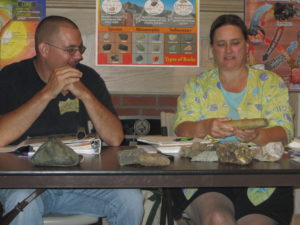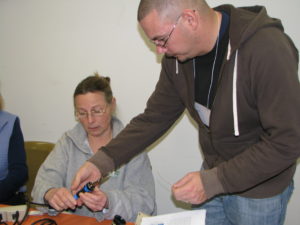Friday, June 3, 2022
For Immediate Release
Holbrook Science Teacher Jason Welch
Helps Educators and Students Build Their STEM Skills
Quincy & Holbrook, MA – Holbrook Middle-High School Science Teacher Jason Welch brings hands-on experience in science, technology, and engineering to his teaching practice, seeks opportunities to build his STEM skills, and shares his knowledge with the science education community. Jason values hands-on, minds-on, inquiry-based teacher professional learning as a means to support students’ interest in science and future STEM careers. He says that educators and students who engage in inquiry-based science investigations “work at their own pace but get to the same place” in terms of learning outcomes and that people realize their own capabilities when they are challenged to solve real-world problems.
Jason pursued his STEM career with encouragement from a high school science teacher who recognized his affinity for science learning. He has worked as a small engine technician for Stewart’s Power Equipment (Holbrook, MA), as a F-18 flight equipment repair specialist for the Marine Corps, and as a mechanic for his own small engine repair business. He transitioned to teaching in 2007 and has since enjoyed using his knowledge of science, technology, and engineering to help students and educators enhance their skills. Jason loves “to see the excitement when people realize they are capable of doing something they didn’t think possible.” He now teaches seventh grade science at Holbrook Middle-High School and presents engineering-focused professional learning workshops with the Wade Institute for Science Education.
During 2010 and 2011 Wade Institute for Science Education Summer Professional Development Institutes, Jason engaged in science learning through hands-on, minds-on, inquiry-based investigations and connected to a broad network of educators, scientists, engineers, and STEM professionals. He learned that everyday goods can be effectively used to design inexpensive, inquiry-based investigations and that the science education community is very supportive of anyone seeking to succeed in sparking students’ interest in STEM. Jason says that his environmental and marine science classes include investigations from the institutes. “When I teach my marine science class, we pick up recyclables, trash bags, and rope,” Jason says, and explains that he challenges his students to figure out how to transform these common household items into essential survival gear for distillation of fresh water from salt water. “We all get it done. Evaporation, [water] collection. Still use that activity today.” Jason now encourages his colleagues to participate in the Wade Institute’s hands-on, minds-on, inquiry-based science, technology, and engineering professional learning programs because they provide Professional Development Points (PDPs), access to usable investigations that are adaptable for different grade level activities, and connections to a continued community of educators that share resources.

Jason investigates rocks and geological formations during a Summer Professional Development Institute.
Jason shares his engineering expertise with fellow educators by teaching the Wade Institute’s SeaPerch Focus Workshops. The SeaPerch marine robotics workshops have brought together Massachusetts middle and high school teachers and a small cohort of their students for professional learning that immersed them in science, technology, and engineering. Participants built a SeaPerch remote operated vehicle (ROV) out of PVC, wired the electrical components, added plankton nets and sampling tubes, and hacked the robots with underwater lights and cameras. “People start off scared and then they learn,” Jason says, “I like getting people comfortable with tools used.” Jason, his students, and Wade Institute Executive Director Sandra Ryack-Bell followed up the first SeaPerch workshop in 2017 by attending a national competition in Manasus, VA. On the trip, they were treated to a tour of Lockheed Martin Corporation’s aerospace showroom near Washington, D.C., where Jason impressed his students with mechanical engineering insight from his days working on F-18 Hornets. The whole experience left Jason inspired about the possibilities people can achieve when they challenge themselves to solve problems that apply to daily life. He has continued to teach SeaPerch Focus Workshops with the Wade Institute and even led a SeaPerch summer camp for Nauset Regional Middle School students in 2017.

Jason shows an educator how to use a soldering iron during a SeaPerch Focus Workshop.
His connection to the Wade Institute brought opportunities to attend state and national conferences and networking events. Jason has shared his experiences engaging learners of all ages in inquiry-based investigations with educators, STEM organizations, businesses, and government officials at the Massachusetts STEM Summit and has co-presented alongside the Wade Institute at the National Science Teaching Association (NSTA) conference. His knack for using everyday items to conduct investigations was put to the test when all his prepared presentation materials were confiscated by airport security on route to the NSTA conference in Chicago, IL. It was a scramble to source local items in a pinch, but Jason found a way to make it work. The result was an adapted hands-on activity that focused on teambuilding and disaster response using materials found at a hardware store. He laughs and says that their presentation went very smoothly the following year since they avoided another last-minute activity supply challenge by renting a car at the NSTA conference in Nashville, TN. “We learned,” Jason says. “I like passing along knowledge that people can use. You get stuck in your classroom and you only know what you know.” He says that conferences are a great opportunity to “try new things” and get inspired by the ideas presented.
What does Jason value most about his experiences with the Wade Institute? Through his involvement with the Wade Institute, Jason has found many ways to connect students to opportunities to see themselves in STEM. “You make good friends,” he says, “It’s like a big family. Everyone is so trusting. It’s a nice way to network.” He comments that he is often recognized by staff at nature and science centers, science museums, education organizations, and companies that have collaborated with the organization. “Companies,” he says, “love showing educators and students tours. Everyone is accepting and willing to have conversations. It’s a student ‘A-ha’ moment…There are people [like me] at the power company that get your service so your cell phone will work.” Jason says that firsthand experiences in the community have helped his students come to understand how school prepares them for STEM careers by providing information they read in their textbooks and skills they learn through hands-on investigations.
Jason looks forward to co-teaching another professional learning Focus Workshop with the Wade Institute. This time, he won’t be building a SeaPerch ROV but investigating the broad uses of mechanical sensors and other electrical components in machines and vehicles with his Holbrook Middle-High School colleague Kevin Monteith, Wade Institute Education Specialist Diana Cost, and scientists and engineers from Sensata Technologies. The workshop will immerse educators in real-world applications of the Science and Engineering Practices and provide insight into possible career pathways for students interested in STEM.
###
The Wade Institute for Science Education specializes in providing inquiry-based, hands-on, minds-on, science, technology and engineering professional development for K-12 teachers and informal educators. For more information, visit www.wadeinstitutema.org or call 617-328-1515.
